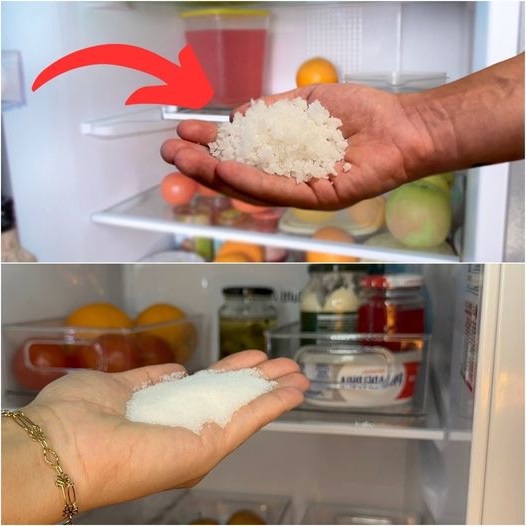What Happens If I Put Salt Under My Tongue? Exploring The Science And Effects
Have you ever wondered what happens if you put salt under your tongue? This simple act may seem harmless, but it can trigger a series of physiological responses in your body. Salt, or sodium chloride, is a common household item with various uses, from cooking to preserving food. However, when placed under the tongue, it can produce unexpected effects that may surprise you. In this article, we will explore the science behind this phenomenon and answer all your questions.
Whether you're curious about the potential benefits or risks of putting salt under your tongue, this article will provide you with detailed insights. We will also discuss the role of salt in the human body and how it interacts with your oral cavity. Understanding the effects of salt under the tongue is crucial for making informed decisions about your health.
As we dive deeper into this topic, we'll cover the science, risks, benefits, and practical applications of this practice. By the end of this article, you'll have a comprehensive understanding of what happens if you put salt under your tongue and whether it's something you should consider trying.
Read also:Does Paintball Hurt A Comprehensive Guide To Pain Safety And Enjoyment
Table of Contents
- The Science Behind Salt Absorption
- Effects of Salt Under the Tongue
- Potential Benefits of Salt Sublingual Application
- Risks and Side Effects
- Comparison with Other Salt Applications
- Common Myths About Salt Under the Tongue
- Impact on Overall Health
- Tips for Safe Use
- Alternatives to Salt for Health Benefits
- Conclusion and Final Thoughts
The Science Behind Salt Absorption
When you place salt under your tongue, it comes into direct contact with the sublingual region, which is rich in blood vessels. This area is known for its ability to absorb substances quickly into the bloodstream. The sublingual route bypasses the digestive system, allowing for faster absorption compared to oral ingestion.
Salt, when dissolved in saliva, breaks down into sodium and chloride ions. These ions can then be absorbed through the mucous membranes under the tongue. This process is similar to how certain medications are administered sublingually for rapid effects.
How Does Sublingual Absorption Work?
Sublingual absorption is a unique mechanism that allows substances to enter the bloodstream directly. Unlike swallowing, where the substance must pass through the digestive tract and liver, sublingual absorption avoids first-pass metabolism. This makes it an effective method for delivering certain nutrients or medications.
- Rich network of blood vessels under the tongue
- Rapid absorption into the bloodstream
- Minimal breakdown by digestive enzymes
Effects of Salt Under the Tongue
Placing salt under your tongue can have both immediate and long-term effects on your body. The rapid absorption of sodium and chloride ions can influence various physiological processes, including hydration, electrolyte balance, and nerve function.
Immediate Effects
Within minutes of placing salt under your tongue, you may notice:
- Increased salivation as your body reacts to the presence of salt
- A tingling sensation due to ion absorption
- Potential relief from mild dehydration
Potential Benefits of Salt Sublingual Application
While the benefits of placing salt under your tongue are not widely studied, some people report positive effects. Here are a few potential benefits:
Read also:How Old Is Sean Duffys Youngest Child Discover The Full Story Behind The Former Governors Family
1. Rapid Hydration
Salt can help restore electrolyte balance, especially when combined with water. Sublingual application may provide quicker hydration compared to drinking water alone.
2. Improved Nerve Function
Sodium plays a crucial role in nerve signaling. By delivering sodium directly into the bloodstream, you may enhance nerve function temporarily.
3. Enhanced Mineral Absorption
Some individuals believe that sublingual salt application improves the absorption of other minerals, such as potassium and magnesium. However, more research is needed to confirm this claim.
Risks and Side Effects
Despite its potential benefits, placing salt under your tongue is not without risks. Here are some side effects to be aware of:
1. Irritation of Oral Tissue
Salt can cause irritation or discomfort in the sensitive tissues under the tongue. Prolonged use may lead to inflammation or damage.
2. Elevated Blood Pressure
Excessive sodium intake, even through sublingual application, can increase blood pressure levels. This is particularly concerning for individuals with hypertension or cardiovascular issues.
3. Dehydration
Paradoxically, too much salt under the tongue can draw water out of your cells, leading to dehydration. It's essential to balance salt intake with adequate water consumption.
Comparison with Other Salt Applications
Placing salt under your tongue is just one of many ways to use salt for health benefits. Let's compare it with other common methods:
1. Oral Ingestion
Eating salt as part of your diet is the most traditional method. However, it takes longer to absorb and may be subject to digestive processes.
2. Salt Water Rinses
Gargling with salt water can help soothe sore throats and reduce oral bacteria. This method focuses on oral hygiene rather than systemic effects.
3. Salt Baths
Soaking in salt water can promote relaxation and reduce muscle tension. While effective for external benefits, it doesn't provide the same rapid absorption as sublingual application.
Common Myths About Salt Under the Tongue
There are several myths surrounding the use of salt under the tongue. Here are a few debunked misconceptions:
Myth 1: It Can Cure All Diseases
Some people claim that sublingual salt application can cure various ailments, from colds to chronic conditions. However, there is no scientific evidence to support these claims.
Myth 2: It's a Substitute for Medication
While salt can provide minor benefits, it should not replace prescribed medications. Always consult a healthcare professional before making any changes to your treatment plan.
Impact on Overall Health
The impact of salt under the tongue on overall health depends on several factors, including dosage, frequency, and individual health conditions. For most people, occasional use is unlikely to cause harm. However, those with pre-existing health issues should exercise caution.
1. Cardiovascular Health
Excessive sodium intake, regardless of the method, can negatively affect cardiovascular health. Monitor your sodium levels carefully if you have heart disease or hypertension.
2. Electrolyte Balance
Maintaining proper electrolyte balance is essential for optimal health. Sublingual salt application may help in cases of mild dehydration but should not replace a balanced diet.
Tips for Safe Use
If you decide to try placing salt under your tongue, follow these tips to ensure safety:
- Use small amounts of high-quality salt, such as Himalayan pink salt or sea salt
- Avoid prolonged use to prevent irritation
- Drink plenty of water to balance sodium levels
- Consult a healthcare professional if you have underlying health conditions
Alternatives to Salt for Health Benefits
If you're looking for alternatives to salt for health benefits, consider these options:
1. Electrolyte Drinks
These beverages provide a balanced mix of sodium, potassium, and other essential minerals to support hydration.
2. Mineral Supplements
Supplements can help meet your daily mineral requirements without the risks associated with excessive salt intake.
3. Balanced Diet
Consuming a diet rich in fruits, vegetables, and whole grains can naturally provide the necessary nutrients for optimal health.
Conclusion and Final Thoughts
In conclusion, placing salt under your tongue can have both benefits and risks. While it may provide rapid hydration and improve electrolyte balance, excessive use can lead to irritation, elevated blood pressure, and dehydration. Always use caution and consult a healthcare professional if you have concerns about your sodium intake.
We encourage you to share your thoughts and experiences in the comments below. Have you tried placing salt under your tongue? What were your results? Don't forget to explore our other articles for more informative content on health and wellness.
Article Recommendations


